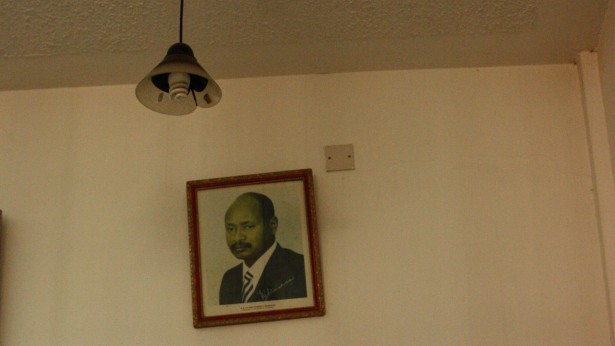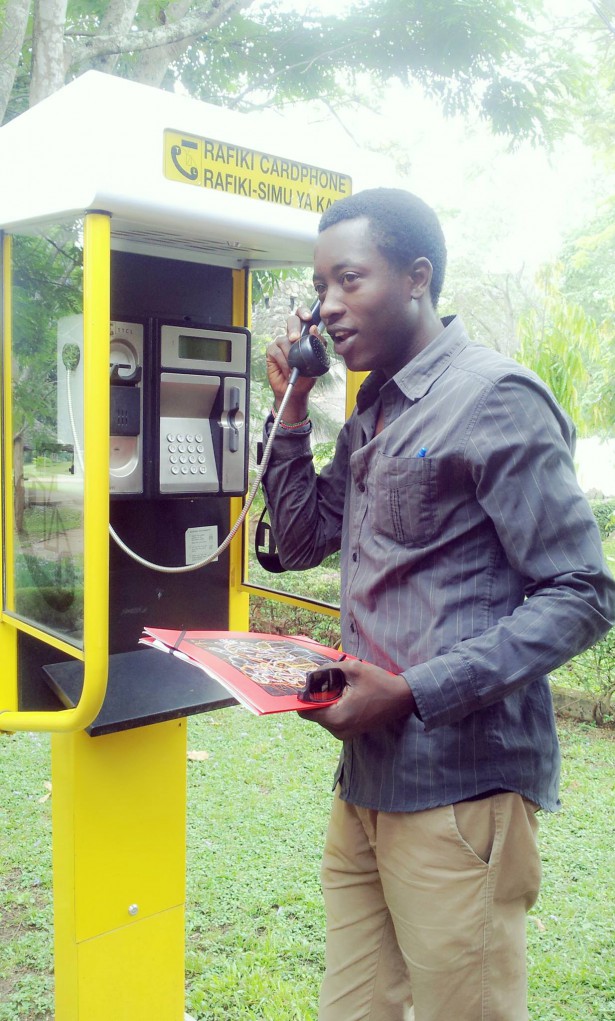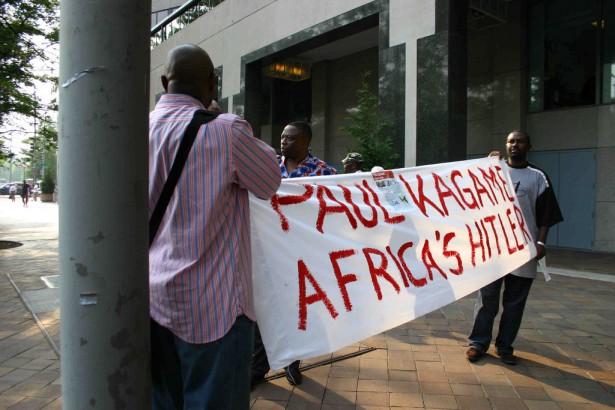
After being released from an illegally prolonged detainment by Ugandan police last year, I opened my Gmail account to find a report from Google documenting suspicious activity on my account throughout the time of my detainment. The source of this activity was somewhere in Kampala, the city where police had retained two of my computers (neither of which have been returned, despite a court directive).
The following day, I read an article in the Daily Monitor, a leading independent newspaper in Uganda, explaining how Uganda’s government was in the process of procuring a fancy phone-tapping machine for about $70 million. This mammoth piece of technology is not only capable of recording both ends of a phone conversation anytime and anywhere in the country, it can even break into email accounts, confirming my suspicions that even after being released, authorities were still monitoring my every move.
The guerrilla bushmen who seized power in Uganda in the mid-1980s built an Orwellian state that relies on an organized offline system of spies speckled throughout the country, as well as a deliberate and extensive ongoing propaganda campaign. But when the masses of young people began using smartphones, these tyrants realized their system of hidden micromanaging would need to be supplemented by a technological crackdown. Consequently, they turned to their security partners in the Global North and — using the rhetoric of terrorism to justify rampant human rights abuses — convinced them to financially support (or at least turn a blind eye to) their rapidly developing Big Brother state.
While countries like the United States offered AK-47 assault rifle training and other tactical support, many of the Ugandan regime’s geopolitical security partners were actually private tech firms and companies. Last month, Privacy International released an extensive report detailing the Ugandan military’s partnership with Gamma International GmbH, a U.K.-based group that supplied the Uganda People’s Defence Force with FinFisher, a spyware program that the regime has used for crushing civil disobedience and blackmailing opponents. This announcement came just a few months after the Italian Hacking Team was exposed by Wikileaks for its communications with the Uganda Police Force — notably the Head of Information and Communications Technology — and President Yoweri Museveni’s office. The IT company’s software has been utilized by the notoriously repressive regimes in Morocco and Ethiopia, and is capable of planting fabricated evidence on victims’ devices.

Sadly, Uganda is far from the only Big Brother state in East Africa to benefit from international security tech firms. Heads of state in East Africa are learning from one another, jumping on the surveillance tech bandwagon one by one.
According to Sungu Oyoo, an organizer and trainer for Kenyans for Tax Justice, “The surveillance state of Kenya is severe given the excuse of terrorism. It can provide a good decoy to clamp down on civil space because it preys on the fears of the public.”
Indeed, Kenyan authorities have infiltrated and harassed various human rights groups, including Muslims for Human Rights and Haki Africa. Some attacks have been physical, resulting in confiscated hard drives, while others were administrative in nature, with accounts frozen and organizations deregistered — an act that was deemed unconstitutional last week in Mombasa’s High Court.
Through its partnership with Hacking Team and legislative affronts such as the Counter Terrorism Act, Kenya’s government has been well-equipped to interfere with large-scale community organizing. Activists eventually realized that by encrypting their email and SMS exchanges, they were only drawing attention to themselves. There is no easy “quick fix” to the rapidly-developing issue of surveillance.
“Whenever I would go to the offices of a funding partner for our movement, an app would open up on my phone showing my location, including the building and floor number,” explained a female activist in Nairobi, who asked not to be identified. “Well-suited men started following me and offering me rides. I had to flee to Uganda and then to Rwanda to lay low for awhile. I was still young in the struggle, so I was baptized by fire.”

Staying away from organizing forever is no solution either, of course. According to Oyoo, “You have to be innovative to avoid being cut off from the world. If you hear the tapping, you use coded language to decide upon a meeting point, usually a public place like a park or coffee shop since your safety is better ensured in those areas. Sometimes, even when you meet at that point, you take a walk to another location and try to get a feel for your privacy and security.”
Oyoo, who is becoming less concerned and more annoyed with the situation, said, “Now I’m at a place where I don’t give a damn. I’ll just give them some entertainment on the phone. I’ll let them know that I know they are listening.”
The smaller, globally misunderstood nation of Burundi faces similar political surveillance challenges as its East African neighbors. Following an attempted coup in May, the government began investing more in the censorship of social media. Youths, who had been portrayed in the international press as violent and chaotic, despite their own claims to the contrary, were forced to invest in more costly and secure platforms to enable communication throughout the capital of Bujumbura.
As youths filled the streets to demand the resignation of President Pierre Nkurunziza, who in August was sworn in for his third term, Appolinaire Nishirimbere — the founder of a local development organization — became heavily active on social media. Although a small number of youths, influenced by politicians, reacted violently at the time of the protests, Nishirimbere said that is no longer the case. “They prefer to unite their voices, which has made social media very important in this situation.” During a time of repression against media outlets and general instability in the country, access to technological spaces was of utmost importance for young people who felt their interests were being deliberately overlooked.
Despite this growing wave of social-media-fueled resistance, Nishirimbere doubts activists will be able to use legal means against state surveillance in Burundi. “The trouble with allegations of phone tapping is that it is very hard to collect evidence of it,” he said.
Even though political space in Burundi has reduced drastically this year, it’s no match for the Rwandan government next door, which is about as Big Brother as Big Brother gets. First, there are breaches of privacy enabled by security technology, coupled with legislation that uses “security” as an excuse to violate human rights and crack down on political dissidents. Secondly, there is a highly organized offline network of spies micromanaging social relations, whereby every house in the country is monitored by a local resident who assesses all his neighbors’ movements and activities. If political conversation not favoring the sitting government takes place even in the privacy of one’s home, that person may “find his own corpse floating belly-up in a lake,” as one human rights defender put it.
Still, these are somewhat “normal” forms of draconian dictatorship in East Africa. What makes Rwandan President Paul Kagame so unique is the extent to which he has developed terrifyingly effective propaganda, both nationally and internationally. Within Kagame’s Rwanda, he is celebrated as a developmental hero. Internationally, Kagame hires public relations firms to concoct news pieces that favor his foreign reputation.
I’ve witnessed the most progressive of my activist friends in the region fall under his spell. He’s brought a kind of infrastructural development to the country that has won over many of his own citizens who will faithfully report you to authorities if you spread a single bad word against him. Prominent members of the virtually-absent Rwandan opposition have been harassed, arrested and abused on numerous occasions. A journalist colleague of mine once criticized Kagame in his campus magazine only to have two of his goons show up the next day to threaten him.

Much as the surveillance states in East Africa are still trying to catch up to speed with the technology in their possession, resistance to Big Brother is also in its infancy. A population that is victimized by an ever-encroaching government must forge its way forward, but due to external factors beyond their own immediate control, a little outside solidarity could help, given that foreign governments and private firms are some of the strongest pillars of support for repressive regimes.
Nishirimbere suggests that telecommunications companies be independent of total state oversight through the establishment of fairer telecommunications laws. “Youths should also learn how to communicate effectively for social change,” he said, noting that some of them have registered for phone lines through false identities so that they are less likely to be tracked. Some send apolitical friends to register a new SIM card when they want some space to communicate freely.
“Citizens in the diaspora should hold these [international] companies accountable by writing to the companies to inform and pressure them,” said Kenyan activist Ruth Mumbi about the security firms that knowingly partner with oppressive governments in East Africa. “In some cases their own countries even have laws against doing the kinds of things they are doing.”
Another challenge relates to access to technology for poor activists. According to Oyoo, “East African activists need to have better access to secure tech. These apps and software also need to be less elitist so that they’re easier to use.” Activists are not always financially privileged individuals, and computer literacy and IT education throughout East Africa are quite low in comparison to other parts of the world. Insisting that activists use a better app or upgrade their hardware is much easier said than done. “Many of us are still on the analog system,” said Kampala-based activist Robert Mayanja, referring to his own cheap phone.
There is also a case to be made for developing a culture of openness — and resisting a culture of secrecy — among nonviolent movements in East Africa. Perhaps Oyoo is on to something when he says he “doesn’t give a damn.” While recklessly tossing around specific names and places obviously isn’t healthy for a movement’s security culture, activists and organizers across East Africa shouldn’t have to conceal their noble efforts either.
As a white American married to an East African, I enjoy many security benefits that my peers may not. Even though the risks are still high, I’m personally resolved to take the route of openness in my activities. (Publishing this article is enough to draw unwanted attention.) Dedicating myself to social change while fathering two children in a repressive context is already exhausting. I really identify with Oyoo’s bitter-yet-resigned attitude. I don’t have the time, money or will to manage technological security on top of my other responsibilities. It’s just much easier to stay resilient by declaring my life an open book, but I sure wouldn’t condemn any of my fellow drivers of social change in the region who would take greater precautions or rather lay low.
